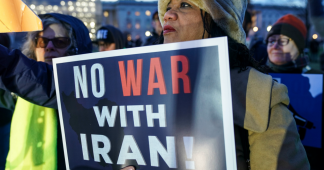by
President Donald Trump’s May 6 veto of a Senate resolution that would have required him to seek congressional approval for any further military confrontations with Iran demonstrates that, despite his occasional feints toward scaling back foreign intervention, Trump is as much a warmonger as anyone else in Washington. Worse still, his explanation for his veto indicates that he believes presidents have unlimited authority to launch wars, contrary to clear constitutional language.
“The question of whether United States forces should be engaged in armed conflict against Iran should only be made following a full briefing to Congress and the American public of the issues at stake, a public debate in Congress, and a congressional vote as contemplated by the Constitution,” reads the resolution. It directs Trump to remove U.S. troops from any hostilities with Iran within 30 days and not to order any further attacks “unless explicitly authorized by a declaration of war or a specific authorization for use of military force.” It does, however, reserve to Trump the right to respond to an “imminent attack.”
In short, the measure simply restates the Constitution’s war requirements, to wit: (1) The United States may not engage in offensive military action absent a congressional declaration of war (the resolution actually weakens this a bit, allowing for a generic “authorization”), and (2) the president is in charge of prosecuting a war once Congress declares it.
But to Trump, who swore an oath to “preserve, protect, and defend the Constitution,” it is “a very insulting resolution,” as he put it in a statement explaining his veto. As far as he is concerned, it was a purely political move “by Democrats as part of a strategy to win an election on November 3 by dividing the Republican Party.” Moreover, “The few Republicans who voted for it played right into their hands.”
That argument has more holes than a piece of Swiss cheese.
To begin with, the senator who introduced it, Virginia’s Tim Kaine, while a liberal Democrat, has consistently pushed for similar measures since joining the Senate in 2013, at which time the Democrat Barack Obama was president.
Next, the resolution wasn’t just dreamed up out of the blue. It was occasioned by Trump’s assassination of Iranian General Qassem Soleimani in January, which precipitated retaliatory strikes on U.S. forces in Iraq. As the resolution explains, Congress wanted to assert its constitutional prerogative in order to ensure that American lives were not put unnecessarily at risk.
As to Republican votes helping Democrats, if voting to uphold the Constitution plays into the opposing party’s hands, so be it. Principle should always — if you’ll pardon the expression — trump politics.
In a statement following the veto, Kaine said, “Last year, in President Trump’s State of the Union remarks, he said: ‘Great nations do not fight endless wars.’ But instead of following through on his word, President Trump vetoed legislation that would help avoid unnecessary war in the Middle East.”
Apparently, Trump isn’t as keen on making America great again as his rhetoric suggests. In fact, the remainder of his veto statement indicates quite the opposite. He demands, and believes he already has, unrestrained authority to take military action whenever and wherever he pleases.
Trump claims that the resolution was “based on misunderstandings of facts and law.” The only allegedly incorrect fact he mentions is the existence of open hostilities between the United States and Iran, but that’s merely a reflection of the time when the measure was drafted. Besides, the two countries are still not exactly at peace with each other, thanks in part to the president.
Trump is the one who is clearly mistaken regarding the law. He insists, as he did in January, that the 2002 Authorization for the Use of Military Force against Saddam Hussein’s Iraq was sufficient justification for killing Soleimani, but as the American Conservative’s Daniel Larison opined, “There is no honest reading of that resolution that supports this interpretation.” In addition, he claims that he derives his war-making power from Article II of the Constitution, yet that article specifically states that “the president shall be commander in chief of the [armed forces] when called into the actual service of the United States.” (Emphasis added.) And who gets to call them into service? According to Article I, Congress does, by declaring war.
Trump doubles down on this unsupportable assertion in his next paragraph:
The resolution implies that the President’s constitutional authority to use military force is limited to defense of the United States and its forces against imminent attack. That is incorrect. We live in a hostile world of evolving threats, and the Constitution recognizes that the President must be able to anticipate our adversaries’ next moves and take swift and decisive action in response. That’s what I did!
“The president talks about Congress’ assertion of its constitutional authority as if they were guilty of lèse-majesté,” observed Larison. “Americans have allowed presidents to wage illegal wars so often and for so long that it was probably just a matter of time before one of them took for granted that his war powers were effectively unlimited. A president who didn’t want to be able to start a war on his own would have no objection to the resolution passed by Congress.”
Of course, Congress doesn’t help matters any by letting presidents get away with such shenanigans. Only eight Republicans were willing to set partisanship aside to vote for the resolution, and the Senate was unable to muster the votes to override Trump’s veto. Occasionally Congress makes noises about withholding funding for certain military adventures, but little ever comes of it. No president has ever been impeached for engaging in unconstitutional wars.
“Many members of Congress, what they want to do is hide under their desk, let the president just do whatever the president wants, and then they think they can escape accountability for the consequences of war,” Kaine told CBS’ Face the Nation in January.
Kaine’s resolution, however, would not have changed the situation much even if Trump had signed it. It was, the New York Times noted, “mostly symbolic and not legally binding.” That an ultimately meaningless restatement of the fundamental law of the land should be so difficult to get on the books is a testament to how far the U.S. government has strayed from the Founders’ intentions.











